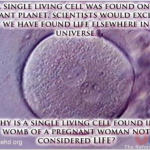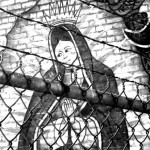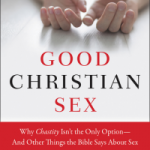Trigger Warning for Rape and Sexual Assault
This post is part of a series discussing research that I’ve done on rape and sexual assault in evangelical Christian dating books called “You Are Not Your Own.”
 One of the questions I had to answer often, from my professors, fellow classmates, and most recently from someone in the audience when I presented my research at an undergrad academic conference is “Why did you choose to study Christian dating books?” I have an academic reason for that, but honestly this all started with something personal. In fact, I think all research has to. I don’t believe that anyone truly “objectively” decides, “Hmm, I think I’ll devote months or even years of my life to studying this random thing that I have no personal attachment to.”
One of the questions I had to answer often, from my professors, fellow classmates, and most recently from someone in the audience when I presented my research at an undergrad academic conference is “Why did you choose to study Christian dating books?” I have an academic reason for that, but honestly this all started with something personal. In fact, I think all research has to. I don’t believe that anyone truly “objectively” decides, “Hmm, I think I’ll devote months or even years of my life to studying this random thing that I have no personal attachment to.”
For me, the initial decision to research dating books came from a personal place. I’d read Christian dating books growing up and had pastors who were influenced by these books or by the same ideologies in these books. As a sexual abuse survivor and later a survivor of intimate partner violence and rape, they hurt. They hurt, and they made me feel broken. So, I started writing about it.
As I wrote about my experiences with rape and sexual assault and talked about how the messages I’d heard from Christian books and sermons affected me, some people criticized. Many people have accused me of saying Mark Driscoll or Joshua Harris or whoever I happen to be talking about approves of rape or is a rapist.
That’s actually not at all what I’m saying.
Regardless of someone’s personal feelings about rape, the attitudes and beliefs about rape, rape victims, and rape perpetrators that we hold as a culture can support rape victims, place proper blame on perpetrators, and lead to justice. Or, those attitudes and beliefs can blame rape victims, make excuses for perpetrators, and lead to a world where only 3% of rapists will ever spend a single day in prison.
Guess which world we live in?
Unfortunately, the society that we live in is not a safe and supportive place for rape and sexual assault survivors. This problem is bigger than whether or not someone approves of rape or is a rapist. Most people are not rapists. I’m guessing most people, when asked, would also say that they believe rape is wrong. Yet, the facts remain–while 1 in 6 women and 1 in 33 men will suffer from sexual assault or attempted sexual assault in their lives, 97% of perpetrators will walk free.
Why?
If we, as a society, don’t approve of rape why are victims afraid to report? Why are people so hesitant to believe victims? Why do so many perpetrators go free?
The problem is those attitudes and beliefs that go beyond individual thoughts. Institutions and power structures funnel those beliefs into our brains. It can be the movies we watch that lie to us, telling us people secretly like rape. It can be the posters hanging on the walls of our high schools and colleges that educate people on how to not-get-raped. It can be judges who ask questions like “What were you wearing?”
We’re embracing ignorance if we pretend that our churches are not also sending us messages about rape and sexual assault. Sometimes those messages may be positive and healthy, but as I find in my research, sometimes they are not.
Our churches and their leaders and the writers of their go-to dating guides don’t have to approve of rape. They don’t have to be rapists.
But what messages are they sending? That’s important. Because regardless of someone’s personal feelings about rape, if these messages blame victims, support perpetrators, and cause confusion as to what rape actually is, then these messages support rape.
What messages are our churches sending?











